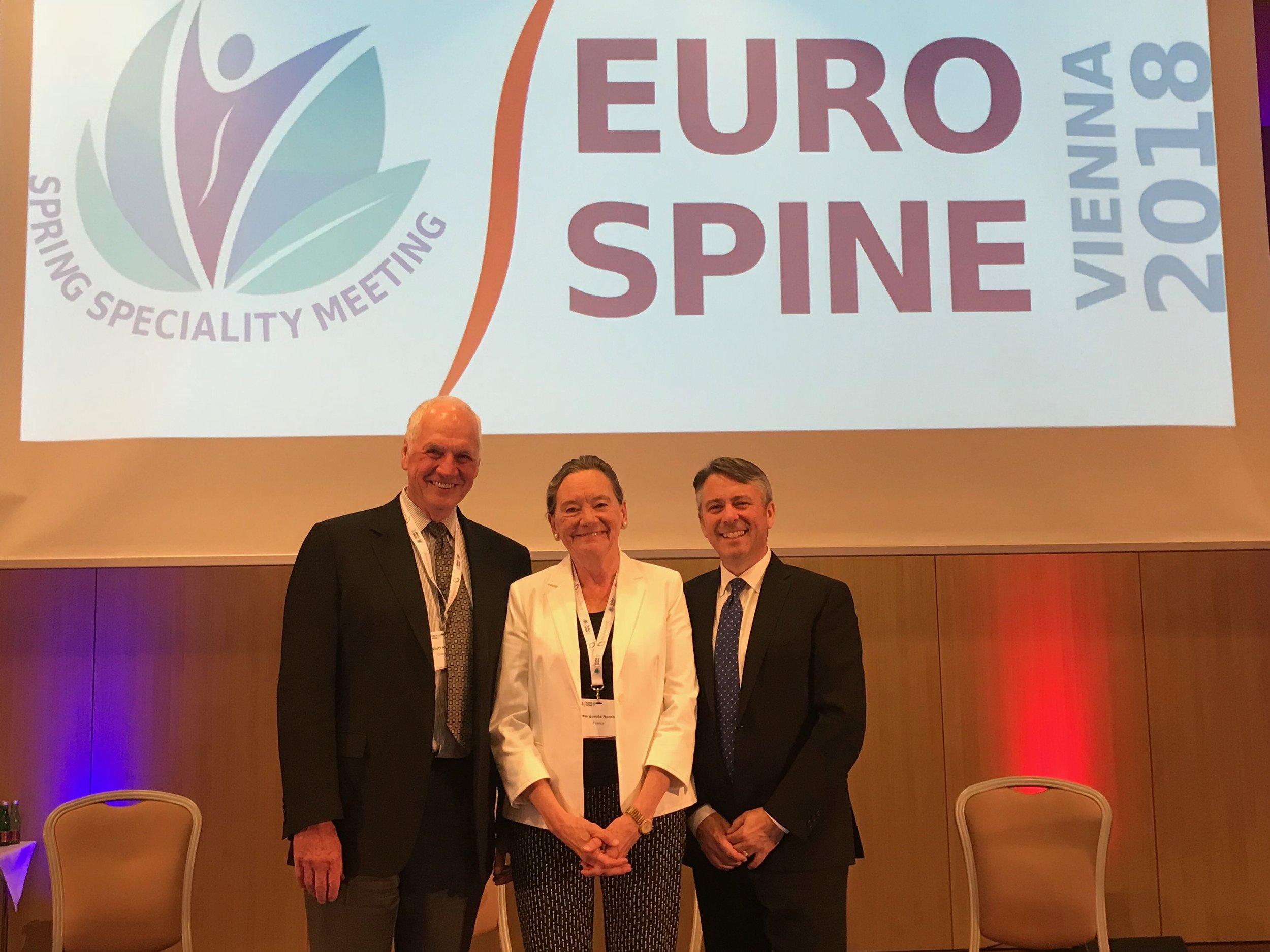A Personal Tribute to Margareta Nordin
Dr. Scott Haldeman, founder and president of World Spine Care, stands with Prof. Margareta Nordin (founder and past president of World Spine Care Europe) and Prof. Pierre Cotê during EUROSPINE 2018.
by Scott Haldeman, DC, MD, Ph.D. FRCP(C)
The passing of Margareta Nordin is a very personal as well as professional loss to anyone who has known or worked with her. My wife, Joan, and I had the privilege of being both close friends and colleagues of hers for 35 years. Although we lived far from each other, she visited our home in California, and we spent time with her in her homes in New York and France. We attended and participated in conferences and workshops throughout the world on all 5 inhabited continents, often multiple times a year. Some of the projects we collaborated on required us to Skype and then Zoom every week for months and years.
Margareta and I served on the executive committee of the ISSLS (International Society for the Study of the Lumbar Spine) and represented the non-surgical members of the organization. She went on to become president of ISSLS. She then became active on the executive committee of the European Spine Society, being elected president, while I became active on the executive committee and president of the North American Spine Society. From these positions, we were able to work together to advance spine care on both sides of the Atlantic. Margareta had a huge impact on defining the role of non-surgical care and rehabilitation services for people disabled by spinal pain.
In 2001, Margareta joined the Secretariat of the Bone and Joint Decade 2000-2010 Task Force on Neck Pain and Associated Disorders that I was asked to chair. We met multiple times each year until 2008, when the results were published in Spine. This was one of the most intense and impactful task forces that either of us had served on, but the final proceedings of this task force were published in 3 separate peer reviewed journals (Spine, European Spine Journal, and the Journal of Manipulative and Physiological Therapeutics) and reset how we should evaluate and treat patients with neck pain. Without Margareta, this task force would have had a much smaller impact. During this period, she was asked to join the Bone and Joint Decade International Coordinating Council (ICC) (2015-2020) and the ICC of the Global Musculoskeletal Alliance. Her capacity for work was remarkable.
Shortly after the publication of the neck pain task force findings, my wife and I decided to establish the World Spine Care charity to improve lives in underserved communities through sustainable, integrated, evidence-based spine care. Shortly after this charity was established, Margareta decided to join us, first as vice president of the US charity and later as founding president of a sister charity in the United Kingdom. It was through her effort that one of the main programs of the charity was established in Navi Mumbai, India. Her commitment to help people without access to spine care never wavered.
The last major project we worked on together was the Global Spine Care Initiative. This project was initiated by World Spine Care with the mission to provide a practical, evidence-informed, and sustainable spine health care model for communities around the world. Again, Margareta took a leading role in this initiative, the results of which were published in a special issue of the European Spine Journal. This initiative has been instituted in all the WSC clinics and is being incorporated into several projects around the world. We continued to work together on projects, including the SPINE20 movement and the establishment of the World Rehabilitation Alliance of the WHO, until she passed.
I am sitting here today trying to shorten this tribute, but I keep remembering additional projects that either would not have happened or would not have had the same impact if she had not been a committed participant. I keep remembering the personal times between or after meetings or lectures when we dreamt up new initiatives over dinner or drinks. She had an amazing life and was an amazing person. It was a real privilege to have been able to work with her on so many projects.
Go well, Margareta, knowing that you made a real difference in this world, that people with spine-related symptoms and disability are better off now than they would have been if you had not spent your life committed to their health and welfare.








